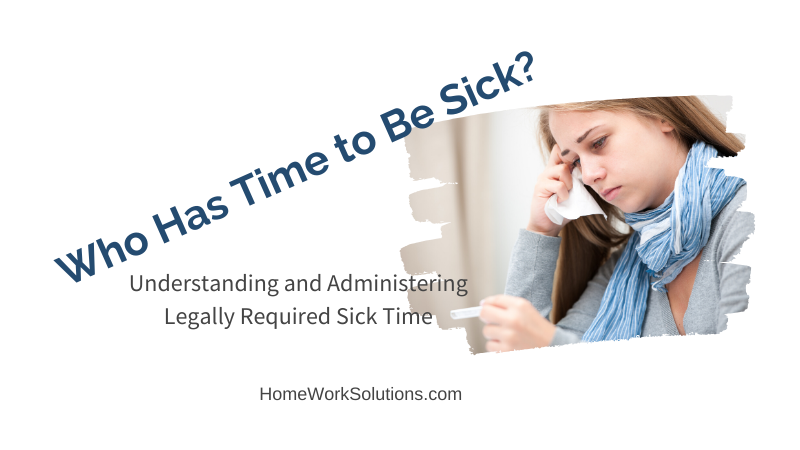 Getting sick can really throw busy families a curveball. It can get especially difficult if your family caregiver is sick. No one has time to get sick, but unfortunately, it does happen. Here are some of the important must-knows about understanding the legal parameters of giving your nanny or senior caregiver designated sick time.
Getting sick can really throw busy families a curveball. It can get especially difficult if your family caregiver is sick. No one has time to get sick, but unfortunately, it does happen. Here are some of the important must-knows about understanding the legal parameters of giving your nanny or senior caregiver designated sick time.
#1: Know the law
Employers are not required to offer benefits that include paid sick time unless it is stipulated by state or local laws. Before hiring your nanny or senior caregiver, be sure you do your research on your state and city laws to know what is required of you. For example, states like Washington and Maryland have recently passed initiatives that require employers to provide paid sick leave to their employees.
It is important to realize that full time domestic workers expect some minimum amount of paid sick leave - generally no less than 5 days per year. Offering some paid sick time is not simply the fair and humane way to treat your household employee, it is also important for staff retention.
We are here to help and offer free telephone consultations at 800.626.4829.
#2: Offer Paid Time Off
Paid Time Off (PTO) is a popular benefit today. This is usually two or more weeks a year, depending on the family, and it can be used for sick time or for vacation. Paid Time Off is especially beneficial to potential employees looking for a job, and when combined with federal paid holidays like Memorial Day, Labor Day, Christmas, Thanksgiving, and New Year, it can be an especially attractive perk of the job. Many employers restrict the use of PTO until the caregiver has had a three-month trial employment period and many also create a “use it or lose it” policy that means they must use their PTO days by the end of the year, or else they will lose them. Some families also offer to pay out unused time at the end of the year as an incentive to prevent last minute call outs.
Even if you are not required to give your nanny or senior caregiver paid sick leave, it is important to attract and retain qualified staff. This will ensure that your nanny or senior caregiver stays with you long term and doesn't suffer financially when ill. Remember your nanny will usually care for your children when ill, and often times their illnesses transfer to her! When you initially hire your nanny and discuss the details about benefits, including sick time or paid time off, memorialize your agreement in a detailed written work agreement. This document will discuss all aspects of the employment package so there is no confusion later down the road.
Not sure where to begin? Our team at HomeWork Solutions is experienced in helping household employers help calculate paid time off and ensure that your nanny is paid accurately and on time. Your life is busy, so let us help simplify it!
Resources:

